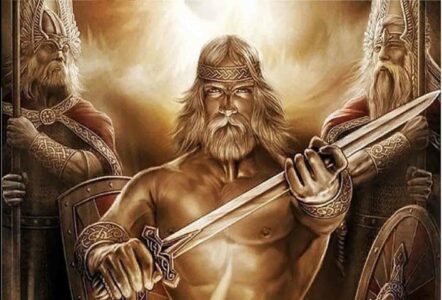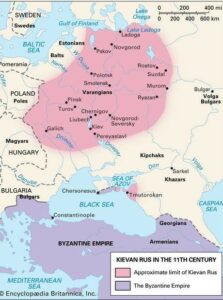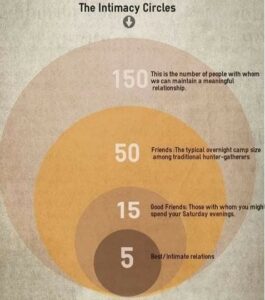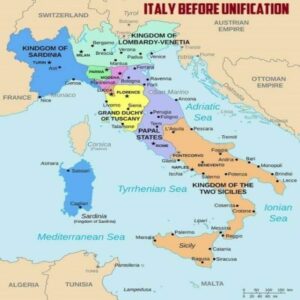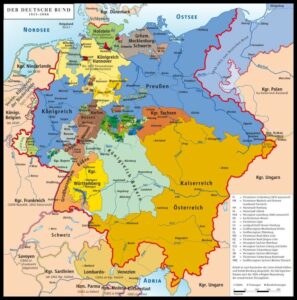Written by Julian Macfarlane, Tokyo based investigative journalist, author, geopolitical and defense analyst
When was Poland Poland?
Will Poland send troops into Ukraine and fight the Russians?
No.
Militarily, it would be stupid.
Then again, the US – and its vassal states—which include Poland are mostly delusional.
But there are other reasons, which are more complex. And to understand them, we have to look at history – although, of course, events in the distant past are of less importance to what is happening today than those most recently. Nevertheless, history defines culture and worldview.
In this case, we must look at the whole idea of “nations” and “nationhood” and “nationalism” which are not today as they once were.
The word “nation” comes from the Latin “natio” which means “breed” or “race”, not as we define such things now —but in terms of a world that in 100 BC was mostly tribal.
In other words, the core meaning of “nation” has to do with tribalism, which is very clear when we look at the Polish example.
Tribalism has evolved.
The Polans and their Gords
But in medieval and pre-medieval times, Poland was inhabited by many tribal peoples, first German tribes fleeing the Huns; then by the West Slavs from the East.
The Lechite West Slavic tribes, the “Polans” —the “people of the open fields “— came together out of fear of incursions from the east. The finally formed the basis of a ducal state under duke Mieszko I of the Plast dynasty and converted to Catholicism. Meiszko’s domain was called the Civitas Schinesghe or “Ducal Gords”, “gords’ being defenses.
These Proto-Poles feared the East just as Modern Poles do today—despite having come from there.
But the “East” was not Russia” then–just the East Slavic Kievan Rus which as you can see incorporated most of what is now the Ukraine.
The Polans spoke Lechitic which is as different from modern Polish as modern English is from early Anglo Saxon. And each Lechitic tribe could be considered a “nation” in itself, as Canada’s “First Nations” are.
Mieszko died, hoping that his domain would be divided among his sons. He did not have a sense of “Poland” as a singular state.
His son, Boleslaw, however, was ambitious. Encouraged by the Papacy, he created the Kingdom of the Polans – Poland— or rather Polska—which was really several Polskas.
It was first Staropolska, “Old Poland”, then Wielkopolska – “Greater Poland” – to which Małopolska “Lesser Poland”, the lands of conquered minorities, was added.
Obviously not everyone in “Poland” was” Polish” and it is unlikely that anyone felt anything like the “national” identity that most people assume today—that mega-tribal feeling of being part of a national family.
“Nations” today are different animals. In Mieszko’s day, realities ruled, especially kinship groups. Family mattered most. But today’s “nations” are as much abstractions as anything else; they exist first in the mind and the imagination — at least until we have to pay our taxes.
The Dunbar Number (s) are the most important numbers
That is true today as well. Nations are big. But necessarily unstable.
Who matters more? A lot of people we don’t know and don’t want to know? Or our wives and husbands and lovers, our children, our parents, our friends?
Culture is one thing: human nature, another.
One of the most important concepts in anthropology is the Dunbar Number, based on the research of Robin Dunbar, who posits that human beings are only capable of real relationships with finite numbers of people.
Some researchers differ with Dunbar with numbers beyond 150 — 300, 400, or 500. But 150 seems significant. That is the average size of military company, with special forces “teams” being much smaller.
“Tribes” are normally about 2000 people but comprised of sub-tribes or clans of 400, which break down into sub-clans or kinship groups of 30 to 50.
In Poland’s case, the kingdom of the Polska was short-lived and devolved tribally. The center would not hold.
Later, however came the Polish-Lithuanian Commonwealth—an empire – which was different beast altogether — a multinational state — later dissolved by Prussia, the Habsburg Empire and the Russians in the late 18th Century.
The average lifespan of an Empire is just two centuries. Why?
The Dunbar Number(s).
The birth of modern nationalism
It was not until the 19th Century – the Age of Nationalism—that Polish nationalism appeared as we know it today – along with all the other nationalisms –including German, Italian, and the like. Mega-Tribes, if you like.
Prior to that, Louis XIV could say with justification “L’etat c’est moi”, meaning “La France c’est moi”. With the French Revolution everything changed. Allegiance shifted to an abstract notion of the “nation.” Not that that precluded absolute rulers such as posited in Hobbes’ Leviathan, supposedly to keep us from killing each other. After the Revolution came Napoleon.
The new “nation states” in this period unified different groups just as the Duke Miezko had done, some ethnic, some political — but usually with the pretense that those who ruled did so for the “people” as a whole— and not for “moi” as Louis would have said; the nation, one big family; the head of state, Poppa or Momma.
Ethnogenesis
This genesis required layers of abstraction —a national mythology, national values often embodied in constitutions and similar documents —a made-up national “identity”, and a whole lot of symbols. Universal education helped a lot. You are brainwashed from kindergarten on.
This is a form of ethnogenesis – an attempt to break with, or at least transform cultural traditions to create a new kind of society, an ethnicity— in this case an artificial one.
It also seeks to transcend the natural limitations of the Dunbar Numbers so that people can feel a connection with people they do not know and do not care about. It is delusional but people die for it.
The United States of America is a good example.
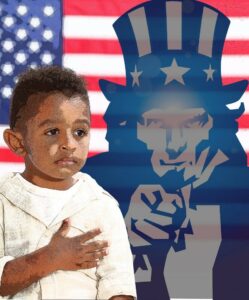
Click to see full-size image
Uncle Sam may want you for something — but he doesn’t care about you. Yet you are taught to care about him.
Germany is another example of ethnogenesis although in a different form from the US.
Prior to the 1870s it was a hodge podge of different countries. By 1914, it had become arguably one of the most progressive countries in Europe, a constitutional monarchy with universal male suffrage, something not achieved in the UK until 1918.
Hitler tried— and partially succeeded— to create a new Germany – with a new origin story, myths of Aryan supremacy, a lot of symbols and banners -and the like. Not to mention, national enemies — the Jews and the Russians. Hate and fear are great motivators.
While the Enlightenment provided the intellectual underpinnings for these changes. The real drivers were new technologies, which resulted in industrialization, which required social and culture restructuring and higher and higher levels of organization. How else could you feed Blake’s “dark satanic mills” and the rise of colonial empires. To create a new society, you have to break the old one.
The 20th Century Nation
In the 20th Century, technological “progress”, changes in industrial state and international trade and commerce, along with the inevitable problems of empires re-defined overall geopolitical context. That, of course, led to WWI. Nations had to redefine themselves and new nations had to come into being. There was a new wave of ethnogenesis. Wilson’s Poland was one result. “Ukraine” was another.
What the West calls “Ukraine” did not exist prior to WWI—not as a nationality.
Ukrainian nationalism had its origins in Galicia, which was Polish, Ruthenian, and Jewish, ruled by Polish nobility after the dissolution of the Polish-Lithuanian Commonweath, with most of the population Ruthenian serfs —managed by Jews forced into this service.
When the Poles sought to create a nation-state independent from the Habsburg Empire in the 19th Century, the Ruthenian population supported the Austrians. They were rewarded with the abolition of serfdom and some measure of representation as an ethnicity in Vienna. As you know, from your teens, “identity” matters a lot.
In 1900, we had Mikhonovsky’s essay “An Independent Ukraine” citing the Pereiaslav Treaty of 1654 wherein the Russians promised to protect the Cossack Hetamate against the Poles. It was also a manipulation if not a falsification of history—the kind of thing that characterizes many, if not most ethnogenetic political movements. When in doubt tweak history.
Are Ukrainians Russian?
The facts of culture and history complicate modern national mythologies and therefore have to be “adjusted” or maybe just forgotten as we do in Japan.
Who exactly were the Ruthenians?
Were they Russian or “proto-Russian”. After all, “Ruthenia” is just the Latin translation of “Russia”! And the various Ukrainian dialects have 80% to 85% commonality with Russian, which is more than many dialects of English.
Put that aside. The ethnogenetic nationalisms of the Industrial age do not admit impediments to aspiration—such as history or fact. It is suspension of disbelief.
The American colonists were mostly English and spoke English and had relatives in England but they didn’t want to be English. They wanted to be “American.” That led to hatred and violence — they lynched Loyalists along with genocidal attacks on the Six Nations tribes.
You won’t hear much about such things just as you won’t read much in the MSM about Ukrainian atrocities — ethnogenesis generates “narratives” — fictions with little room for truth.
The creation of Poland and its conquest of Western Ukraine brought with it suppression of Ruthenian-Ukrainian aspirations. Ruthenians were serfs again – just serfs by another name—Ukrainians.
But they were given hope — by — as Putin has noted — Lenin—and the Russians — who promoted “Ukrainization” to create a Ukrainian identity for the territory they controlled, banning Russian in the schools, for example. This lasted a decade until reversed by Stalin in 1933.
When Poland fell in 1939, Russia took back the historic lands of the ‘Rus, including Galicia. Stepan Bandera, now the “Father” of the Ukraine, led the way slaughtering thousands of Poles, as well as Jews in 1943. Now he has been canonized by the NeoNazis.
As you can see, it is unlikely that Western Ukrainians will welcome the Poles —or the Poles will want to try to rule Western Ukraine. Oil and water. That’s really why the Poles will not send troops across the border. Most important of all, Poland is a new nation and not what is was.
For the rest of the article click here



